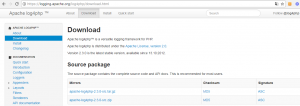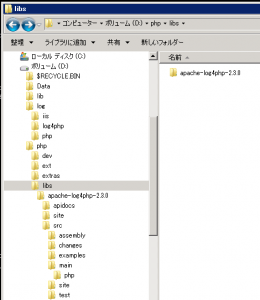PEAR等を使わずに単純に使う方法
log4phpのダウンロードページよりzip形式のSource packageをダウンロード。
phpフォルダの下にlibsフォルダを作成してダウンロードしたlog4phpを展開
Logger.phpがあるフォルダにPATHを通すためにphp.iniのinclude_pathを設定
;;;;;;;;;;;;;;;;;;;;;;;;; ; Paths and Directories ; ;;;;;;;;;;;;;;;;;;;;;;;;; ; UNIX: "/path1:/path2" ;include_path = ".:/php/includes" ; ; Windows: "\path1;\path2" ;include_path = ".;c:\php\includes" include_path = ".;c:\php\includes;D:\php\libs\apache-log4php-2.3.0\src\main\php"
PATHが通ったフォルダ(今回はD:\php\libs\apache-log4php-2.3.0\src\main\php)に設定ファイル(log4php.xml)を作成して配置
<configuration xmlns="http://logging.apache.org/log4php/">
<appender name="default" class="LoggerAppenderFile">
<param name="file" value="default.log" />
</appender>
<appender name="myAppender" class="LoggerAppenderFile">
<param name="file" value="d:/log/log4php/myLog.log" />
</appender>
<root>
<level value="warn" />
<appender_ref ref="default" />
</root>
<logger name="myLogger">
<level value="debug" />
<appender_ref ref="myAppender" />
</logger>
</configuration>
以下がログの出力
require_once("Logger.php");
Logger::configure('log4php.xml'); // 設定ファイルの読み込み
$logger = Logger::getLogger('myLogger'); // myLoggerという名前のloggerを使用
$logger->debug("debug message");

